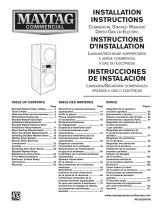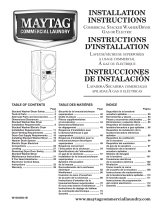
24" (61 cm) Electric & 27" (69 cm) Electric and
Gas Washer/Dryer Installation Instructions
Instructions pour l’installation de la laveuse/sécheuse
électrique de 24" (61 cm) et électrique et à gaz de 27" (69 cm)
Instrucciones de instalación de la lavadora/secadora
eléctrica de 24" (61 cm) y eléctrica y de gas de 27" (69 cm)
Table of Contents Table des matières
WASHER/DRYER SAFETY ..............................................................................2
INSTALLATION REQUIREMENTS ...................................................................5
LOCATION REQUIREMENTS ..........................................................................7
DIMENSIONS/CLEARANCES, 27" (69 CM) MODELS ...................................8
DIMENSIONS/CLEARANCES, 24" (61 CM) MODELS ..................................9
DRAIN SYSTEM .............................................................................................10
ELECTRICAL REQUIREMENTS, 240 V ELECTRIC MODELS – U.S.A. .........11
ELECTRICAL REQUIREMENTS, 120 V ELECTRIC MODELS – U.S.A.
AND CANADA (24" [61 CM] MODELS ONLY) ..............................................12
ELECTRICAL REQUIREMENTS, 240 V ELECTRIC MODELS – CANADA ....12
ELECTRICAL REQUIREMENTS, GAS MODELS
(27" [69 CM] MODELS ONLY) .......................................................................13
GAS SUPPLY REQUIREMENTS, GAS MODELS
(27" [69 CM] MODELS ONLY) .......................................................................13
REMOVE FOAM PACKING (24" [61 CM] MODELS) ....................................14
ELECTRICAL CONNECTION, 27" (69 CM) ELECTRIC MODELS
(U.S.A. ONLY) .................................................................................................15
ELECTRICAL CONNECTION, 24" (61 CM) 240 V ELECTRIC MODELS
(U.S.A. ONLY) .................................................................................................21
VENTING ........................................................................................................25
CONNECT DRAIN HOSE ...............................................................................28
CONNECT INLET HOSES ..............................................................................29
MAKE GAS CONNECTION (GAS 27" [69 CM] MODELS ONLY) .................30
CONNECT VENT ............................................................................................31
FINAL INSTALLATION STEPS .......................................................................32
COMPLETE INSTALLATION CHECKLIST ....................................................35
W11425717B
INSTALLATION NOTES
Date of purchase: ________________________________________
Date of installation: _______________________________________
Installer: _________________________________________________
Model number: ___________________________________________
Serial number: ___________________________________________
Date d’achat : ____________________________________________
Date d’installation : _______________________________________
Installateur : _____________________________________________
Numéro de modèle : ______________________________________
Numéro de série : ________________________________________
NOTES CONCERNANT L’INSTALLATION
SÉCURITÉ DE LA LAVEUSE/SÉCHEUSE ....................................................36
EXIGENCES D’INSTALLATION .....................................................................39
EXIGENCES D’EMPLACEMENT ..................................................................41
DIMENSIONS/DISTANCES DE DÉGAGEMENT,
MODÈLES DE 27" (69 CM) ............................................................................42
DIMENSIONS/DISTANCES DE DÉGAGEMENT,
MODÈLES DE 24" (61 CM) ............................................................................43
SYSTÈME DE VIDANGE ................................................................................44
SPÉCIFICATIONS ÉLECTRIQUES, MODÈLES ÉLECTRIQUES
DE 120 V (MODÈLES DE 24" [61 CM] UNIQUEMENT – CANADA ..............45
SPÉCIFICATIONS ÉLECTRIQUES, MODÈLES ÉLECTRIQUES
DE 240 V – CANADA ......................................................................................45
SPÉCIFICATIONS ÉLECTRIQUES, MODÈLES À GAZ
(MODÈLES DE 27" [69 CM] UNIQUEMENT) ................................................46
SPÉCIFICATIONS DE L’ALIMENTATION EN GAZ, MODÈLES À GAZ
(MODÈLES DE 27" [69 CM] UNIQUEMENT) ................................................47
ENLEVER L’EMBALLAGE EN MOUSSE (MODÈLES DE 24" [61 CM]) .......48
ÉVACUATION .................................................................................................49
RACCORDEMENT DU TUYAU DE VIDANGE ...............................................52
RACCORDEMENT DES TUYAUX D’ARRIVÉE D’EAU .................................53
RACCORDEMENT À LA CANALISATION DE GAZ
(MODÈLES À GAZ DE 27" [69 CM] UNIQUEMENT) ....................................54
RACCORDEMENT DU CONDUIT D’ÉVACUATION .....................................55
ÉTAPES D’INSTALLATION FINALES ............................................................56
LISTE DE VÉRIFICATION POUR L’ACHÈVEMENT
DE L’INSTALLATION ......................................................................................59
Índice
SEGURIDAD DE LA LAVADORA/SECADORA .............................................60
REQUISITOS DE INSTALACIÓN ...................................................................63
REQUISITOS DE UBICACIÓN .......................................................................65
DIMENSIONES Y ESPACIOS LIBRES, MODELOS DE 27" (69 CM) ...........66
DIMENSIONES Y ESPACIOS LIBRES, MODELOS DE 24" (61 CM) ...........67
SISTEMA DE DESAGÜE ................................................................................68
REQUISITOS ELÉCTRICOS, MODELOS ELÉCTRICOS DE 240 V ..............69
REQUISITOS ELÉCTRICOS, MODELOS ELÉCTRICOS DE 120 V
(MODELOS DE 24" [61 CM] SOLAMENTE) ..................................................70
REQUISITOS ELÉCTRICOS, MODELOS A GAS
(MODELOS DE 27" [69 CM] SOLAMENTE) ..................................................71
REQUISITOS DEL SUMINISTRO DE GAS, MODELOS A GAS
(MODELOS DE 27" [69 CM] SOLAMENTE) ..................................................72
QUITE EL EMBALAJE DE HULE ESPUMA (MODELOS DE 24" [61 CM]) ....73
CONEXIÓN ELÉCTRICA, MODELOS ELÉCTRICOS
DE 27" (69 CM) (EE.UU. SOLAMENTE) ........................................................74
CONEXIÓN ELÉCTRICA, MODELOS ELÉCTRICOS
DE 24" (61 CM) DE 240 V (EE.UU. SOLAMENTE) ........................................80
VENTILACIÓN ................................................................................................84
CONECTE LA MANGUERA DE DESAGÜE ...................................................87
CONECTE LAS MANGUERAS DE ENTRADA ..............................................88
CONEXIÓN DEL SUMINISTRO DE GAS (MODELOS A GAS
DE 27" [69 CM] SOLAMENTE) ......................................................................89
CONECTE EL DUCTO DE ESCAPE ..............................................................90
PASOS FINALES DE INSTALACIÓN .............................................................91
LISTA DE CONTROL PARA LA REALIZACIÓN
DE LA INSTALACIÓN .....................................................................................94
NOTAS DE INSTALACIÓN
Fecha de la compra: ______________________________________
Fecha de la instalación: ___________________________________
Instalador: _______________________________________________
Número de modelo: ______________________________________
Número de serie: _________________________________________





















